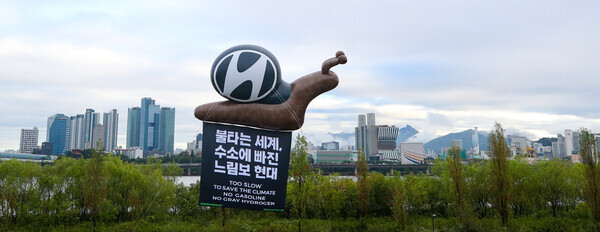hankyoreh
Links to other country sites 다른 나라 사이트 링크
Hyundai-Kia stands at 5th place in Greenpeace’s eco-friendliness ranking of top 10 automakers

Hyundai-Kia Motors slipped a spot to No. 5 in this year’s ranking of environmental friendliness among the world’s top 10 automakers by Greenpeace East Asia, the international environmental protection group’s branch in the region.
Toyota came in last place for a second year running.
On Thursday, Greenpeace released its “Auto Environmental Guide 2022” report ranking the world’s top 10 automakers. The companies examined, which represent the top 10 globally in terms of automobile sales, were Toyota, Volkswagen, Hyundai-Kia, Stellantis, General Motors (GM), Honda, Ford, Nissan, Renault, and Mercedes-Benz.
Greenpeace based its final scores on an assessment of each company’s environmental performance and plans in four categories, namely the phasing out of internal combustion engines in favor of electric vehicles, supply chain decarbonization, resource sustainability, and problem areas.
The results showed GM in first place for a second straight year with 38.5 points out of 100, followed by Mercedes-Benz (37.0), Volkswagen (33.3), and Ford (23.5%). Hyundai-Kia came in at fifth place with a score of 22.3 points, sliding one spot from fourth place last year. Beneath it were Renault (20.3), Stellantis (19.3), Nissan (13.4), Honda (12.8) and Toyota (10.0).
Hyundai-Kia received positive ratings for the increase in its sales of electric vehicles (EVs), hydrogen vehicles, and other vehicles without greenhouse gas emissions, which rose by around 75% from roughly 130,000 in 2020 to 230,000 last year.
Another positive factor in its rating was the increase in the percentage of these vehicles among total sales, which climbed from 2.18% to 3.49% over the same period. The automaker received additional points for its steel decarbonization efforts, including its business partnership with low-carbon steelmakers.
But it also lost points for the high percentage of sport utility vehicles — which consume large amounts of energy — among its total sales. SUVs accounted for 49% of Hyundai-Kia’s sales last year, the highest percentage for any of the top 10 automakers.
Additionally, Hyundai-Kia was docked points for its failure to present a plan for halting internal combustion engine vehicle sales in the global market outside of Europe and the US.
The three Japanese automakers at the bottom of the list all showed low percentages of EV sales. Toyota came in last place among the top 10, with EVs accounting for just 0.18% of its total vehicle sales last year. For Honda and Nissan, the respective percentages were 0.35% and 2.2%.
Toyota also scored at the bottom in categories such as decarbonization of its component supply chains and recycling of resources. It faced further deductions for actions counteracting the climate change response, including lobbying the Japanese government for support for hybrid vehicles last June.
GM, which topped the list, has sold many low-cost Wuling Hongguang Mini EVs in the Chinese market. In 2021, the company recorded 420,000 sales of the microcar model in China.
Greenpeace urged the top 10 automakers to declare their commitment to halting internal combustion engine vehicle sales before 2030.
The International Energy Agency has stressed that carbon neutrality must be achieved by 2050 to prevent global temperatures from rising by 1.5 degrees. To achieve this, it has recommended that all new sales of vehicles with internal combustion engines be halted by 2035 at the latest.
Ada Kong, program manager for Greenpeace East Asia, stressed that the auto industry as a whole must be encouraged to halt sales of internal combustion engines by 2030 throughout the global market.
By Kim Yoon-ju, staff reporter
Please direct questions or comments to [english@hani.co.kr]

Editorial・opinion
![[Column] Life on our Trisolaris [Column] Life on our Trisolaris](https://flexible.img.hani.co.kr/flexible/normal/500/300/imgdb/original/2024/0505/4817148682278544.jpg) [Column] Life on our Trisolaris
[Column] Life on our Trisolaris![[Editorial] Penalties for airing allegations against Korea’s first lady endanger free press [Editorial] Penalties for airing allegations against Korea’s first lady endanger free press](https://flexible.img.hani.co.kr/flexible/normal/500/300/imgdb/original/2024/0502/1817146398095106.jpg) [Editorial] Penalties for airing allegations against Korea’s first lady endanger free press
[Editorial] Penalties for airing allegations against Korea’s first lady endanger free press- [Editorial] Yoon must halt procurement of SM-3 interceptor missiles
- [Guest essay] Maybe Korea’s rapid population decline is an opportunity, not a crisis
- [Column] Can Yoon steer diplomacy with Russia, China back on track?
- [Column] Season 2 of special prosecutor probe may be coming to Korea soon
- [Column] Park Geun-hye déjà vu in Yoon Suk-yeol
- [Editorial] New weight of N. Korea’s nuclear threats makes dialogue all the more urgent
- [Guest essay] The real reason Korea’s new right wants to dub Rhee a founding father
- [Column] ‘Choson’: Is it time we start referring to N. Korea in its own terms?
Most viewed articles
- 160% of young Koreans see no need to have kids after marriage
- 2[Column] Life on our Trisolaris
- 3[Reporter’s notebook] In Min’s world, she’s the artist — and NewJeans is her art
- 4Hybe-Ador dispute shines light on pervasive issues behind K-pop’s tidy facade
- 5[Editorial] Penalties for airing allegations against Korea’s first lady endanger free press
- 6Presidential office warns of veto in response to opposition passing special counsel probe act
- 7Vietnamese war victims speak of sexual violence by S. Korean troops for the first time
- 8S. Korea discusses participation in defense development with AUKUS alliance
- 9Japan says it’s not pressuring Naver to sell Line, but Korean insiders say otherwise
- 10Months and months of overdue wages are pushing migrant workers in Korea into debt